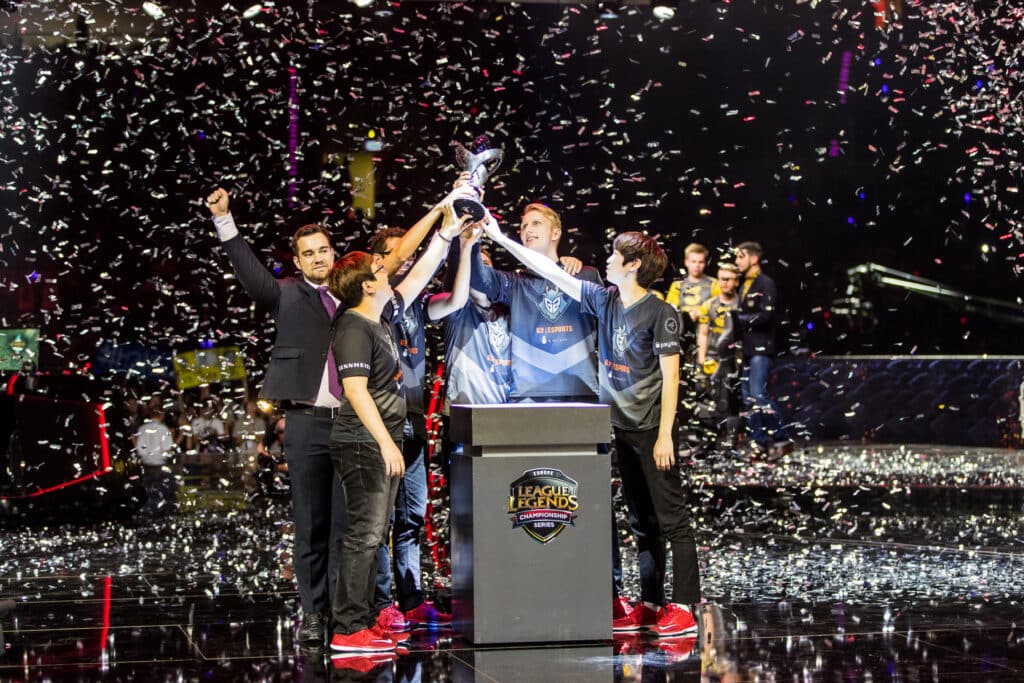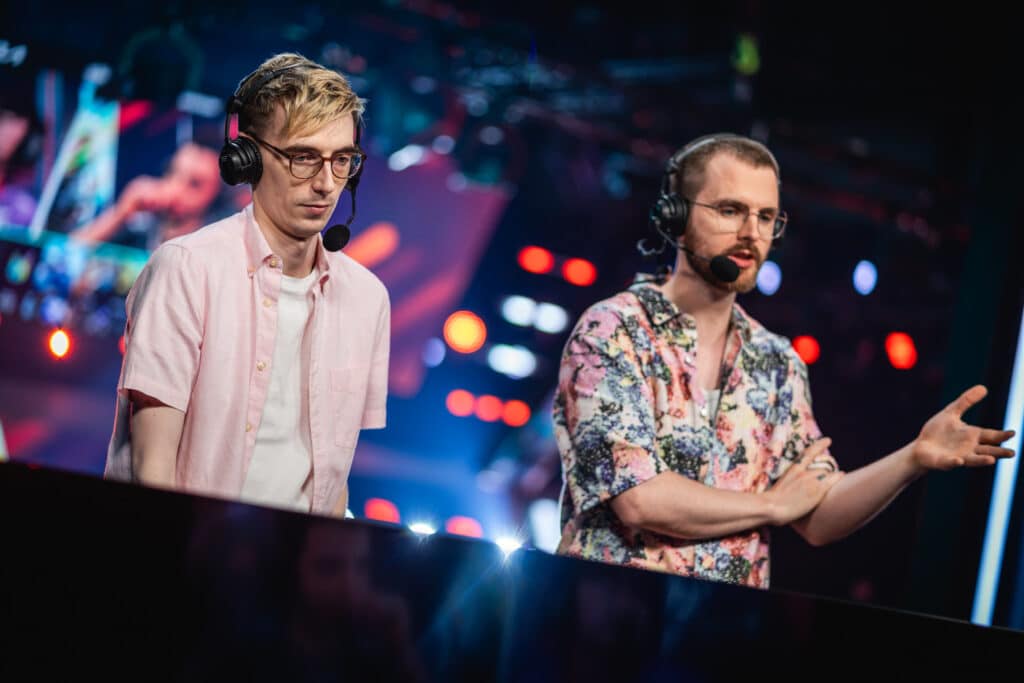In the vibrant, often chaotic world of competitive esports, a select few voices rise above the roar of the crowd and the flurry of on-screen action. These aren`t the players making the clutch plays, nor the coaches strategizing behind the scenes. They are the casters – the verbal architects who transform mere gameplay into compelling narratives, guiding millions of viewers through every nail-biting moment. Among the most recognizable in the League of Legends EMEA Championship (LEC) are Daniel Drakos and Andrew `Vedius` Day, a duo whose wit and insight have become synonymous with the broadcast`s distinctive charm.
For nearly a decade, Drakos and Vedius have not merely described the action; they`ve imbued it with meaning, personality, and a self-aware humor that sets the LEC apart. Their work transcends simple play-by-play, delving into a profound philosophy of what it means to truly cast an esports event. It`s a craft built on observation, preparation, and perhaps most crucially, a fundamental understanding of their place within the spectacle.
The Cardinal Rule: “The Show Isn`t About You”
At the heart of Drakos`s and Vedius`s approach lies a principle that, while seemingly straightforward, demands immense discipline: “The show isn`t about you.” This isn`t a plea for humility, but a technical directive. The spotlight, they contend, belongs firmly on the game, the players, and the unfolding story of competition. Casters are facilitators, not protagonists.
This philosophy stands as a bulwark against the ego often lurking in performance roles. In a live environment, the temptation to inject one’s personality or opinions too strongly can be immense. Yet, the finest casters understand that their role is to amplify the drama already inherent in the game, to highlight the incredible skill on display, and to contextualize the stakes for the audience. Any deviation from this focus risks detracting from the very spectacle they are hired to elevate. It`s a subtle art of being undeniably present and engaging, yet simultaneously invisible to the core narrative.
Weaving Tales in a Shifting Meta
One of the most formidable challenges for an esports caster is the ever-evolving nature of the game itself. Rosters change, balance patches rewrite the rulebook, and new dominant teams emerge, demanding that storytellers constantly adapt. Drakos and Vedius joined the LEC (then EU LCS) during a period of significant flux, as the long-reigning titan Fnatic began to cede its crown.
What followed was an era defined by the meteoric rise of G2 Esports. While G2`s consistent excellence brought undeniable recognition to the region, it also presented a unique narrative challenge for casters. As Vedius noted with a hint of creative exasperation, the league became “very centred around G2.” For storytellers, perpetual dominance can limit narrative branches. Every other team`s story, it seemed, became a variation of “can they finally beat G2?”

Drakos candidly admitted, “It got to the point where it’s annoying. Because we know people get tired of hearing it.” The irony, of course, being that G2 often continued to win, reinforcing the very narrative exhaustion. However, amidst this sustained dominance, both casters express optimism for a more balanced future, hinting at renewed competitive parity that promises a richer tapestry of stories for seasons to come. The league`s lower half might still be a “hot mess,” but the top is starting to look refreshingly unpredictable.
The Illusion of Bias and the Pursuit of Truth
Another frequent misconception casters face revolves around perceived favoritism. Fans, deeply invested in their chosen teams, often accuse casters of bias. Drakos is quick to debunk this, stating, “I think it’s really rare that a caster ever carries any more than a small amount of unconscious bias.”
Vedius offers a nuanced perspective: while genuine professional bias is rare, regional pride is an undeniable, human element. “I have EU bias, but I don’t shy away from that at international competition,” he admitted. “I do want EU teams to win.” Yet, this personal leaning is meticulously compartmentalized. Once the mic is on, professionalism dictates objectivity. Whether it`s rooting for a beloved underdog or witnessing a favored team facing certain defeat, the narrative must remain balanced, respectful, and accurate. The goal is to represent the players faithfully, keeping them and their performance “at the forefront of everything,” regardless of personal hopes for the outcome.
The Great Balancing Act: Entertainer or Educator?
Perhaps the most philosophical debate within casting circles centers on the core function: should a caster primarily entertain or educate? Both Drakos and Vedius, while holding slightly different emphasis due to their respective roles (play-by-play vs. color caster), agree that it`s a delicate dance.
Drakos leans into the entertainment aspect: “Your job, first and foremost, is to be an entertainer. But the show isn’t about you — it’s about the game, the competition, and the story of these players.” He argues that the game itself, with its high stakes and incredible personalities like Faker, provides all the raw material for compelling entertainment. Failure to make such inherent drama engaging, he suggests, is a failure of the caster.

Vedius, as a color caster, naturally emphasizes the educational component: “As a colour caster, my responsibility is to inform the viewer of what’s happening. As long as you, as a viewer, understood what just happened, then I’ve done my job.” Yet, he clarifies, this isn`t about teaching every intricate mechanic. It`s about providing context and significance, ensuring the audience grasps the `why` behind the `what` of each pivotal play. It’s making the complex accessible without dumbing it down.
The ultimate goal, they concur, is a sophisticated blend of showmanship, deep game knowledge, and empathy for the audience, whether they are seasoned veterans or curious newcomers. Unlike more visually immediate esports like FPS games, League of Legends` strategic depth demands casters serve as indispensable guides, translating intricate maneuvers into digestible, exciting narratives.
The Global Symphony of Storytellers
Beyond the individual broadcasts, Drakos and Vedius highlight a less visible but equally crucial aspect: the deep collaboration within the international casting community. Vedius notes a “great working relationship” with other casters globally, making a deliberate effort to communicate and understand key narratives from different regions. This collaborative spirit ensures that when teams from various leagues clash on the international stage, the casters are equipped to represent all players and storylines accurately, reinforcing the idea that “what we care about is that the pros are best represented.”
After nearly a decade together, shaping the sonic landscape of LEC, Drakos and Vedius continue to embody the evolution of esports casting. Their work is a testament to the idea that commentary is not just an add-on but an integral part of the spectacle. It`s storytelling in its most immediate, unscripted, and passionately shared form – an ongoing mission to make every moment, every skirmish, and every grand final feel genuinely significant. The show, after all, isn`t about them, but without them, the show wouldn`t be quite the same.








